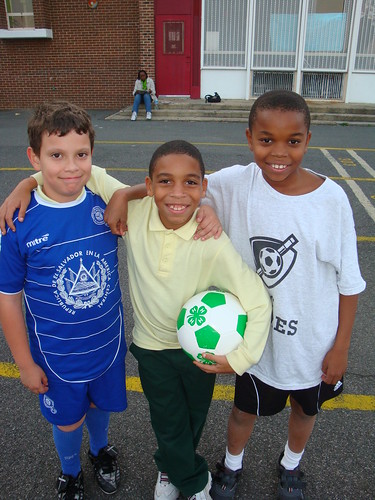
Raising children to be their very best is not a concept unique to any particular country; rather, teaching youth to make better choices and create positive change in their communities is a common theme.
4-H is an American program that provides positive youth development by promoting citizenship, healthy living, science, civic affairs, leadership, positive relationships, safe areas for risk-taking, and more. In 2015, nearly 6.5 million adult volunteers and youth sported the green four-leaf clover as they prepared for college, work, career, and life. As iconic as it is, 4-H is not just an American phenomenon, its principles have become deeply entrenched abroad, as well.
Led by 4-H National Headquarters, within USDA’s National Institute of Food and Agriculture (NIFA), 4-H is drawing upon its deep experience to help other nations create similar youth development programs. Worldwide, more than 7 million youth in at least 80 countries are involved in youth development programming, from South America’s Bolivia; to Africa’s Nigeria and Namibia; to the Nordic nations of Finland, Sweden, and Norway; and, in 2014, to the mountainous Asian nation of Nepal.
NIFA has administered 4-H for more than a century in close collaboration with the Cooperative Extension Systems of the nation’s land-grant universities (LGUs). The U.S. 4-H program — its name, emblem, and brand — has been an important training ground for many American leaders over the years, including presidents and vice presidents (Jimmy Carter, Walter Mondale, and Al Gore), first ladies (Jacqueline Kennedy Onassis and Rosalynn Carter), entertainers (Reba McEntire, Dolly Parton and Johnny Carson), and countless athletes and entrepreneurs.
Youth development can take any number of paths to appear abroad, including LGUs that mentor other countries as they develop their own programs modelled after 4-H. NIFA also routinely provides youth development expertise to USDA’s Foreign Agricultural Service, the U.S. Department of State, and USAID as they conduct work in other countries.
In addition, States’ 4-H International Exchange Programs, a non-profit organization headquartered in Seattle, Washington, sponsors international exchange programs for cultural immersion and exchange programs. These exchanges create opportunities for 4-H’ers to gain global experience in leadership, service, and project work. Since 1972, nearly 50,000 youth and their families from 24 countries on six continents have participated.
NIFA invests in and advances agricultural research, education and extension and seeks to make transformative discoveries that solve societal challenges.

